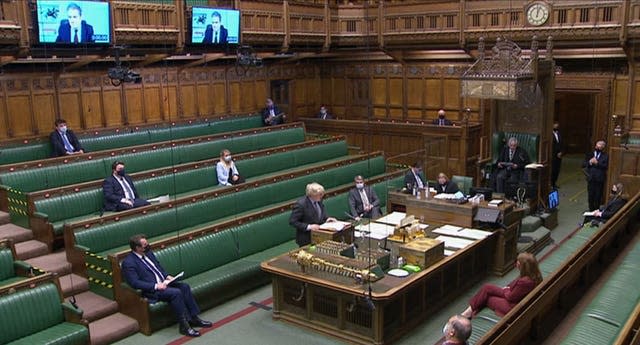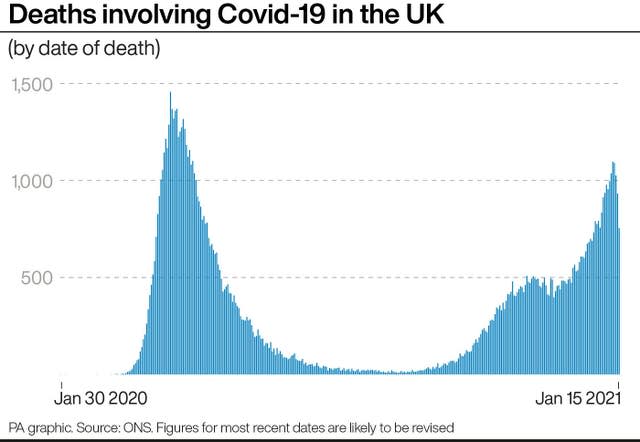Johnson: ‘Tougher’ quarantine measures for countries with mutant coronavirus
Tougher new quarantine measures will only apply to the “red list” countries of most concern rather than being a blanket measure, Boris Johnson indicated.
The Prime Minister said the measures – expected to include a plan forcing arrivals from Covid-19 hotspots to quarantine in hotels – would be set out by Home Secretary Priti Patel.
Mr Johnson also said that “in the next few weeks” he would set out the exit route from the pandemic and the current lockdown.
The Prime Minister will use a Commons statement later on Wednesday to outline a plan for England’s schools, which are currently closed to all but vulnerable pupils and the children of key workers.
At Prime Minister’s Questions, Mr Johnson said the new quarantine measures for England being set out by Ms Patel would be aimed at preventing concerning new mutant strains of the virus reaching Britain.
He said: “The Home Secretary will be setting out later today … even tougher measures for those red list countries where we are particularly concerned about new variants.”
Prime Minister’s Questions was dominated by coronavirus after the UK passed 100,000 deaths according to the Government’s figures.
Labour leader Sir Keir Starmer asked: “Why has the United Kingdom the highest number of deaths in Europe, why has the United Kingdom a death rate that is higher than almost anywhere in the world?”
Mr Johnson insisted it was not yet time for an inquiry into the handling of the pandemic “when we are in the throes of fighting this wave of the new variant, when 37,000 people are struggling with Covid in our hospitals”.
He told MPs “there are no easy answers – perpetual lockdown is no answer” to the challenges posed by the virus.
England’s current lockdown is due to be reviewed on February 15 and Mr Johnson said: “I hope very much to be, in the next few weeks … setting out in much more detail how this country can exit now from the pandemic.”

One route out of the crisis is offered by the vaccination campaign, with Mr Johnson telling MPs that 6.9 million people have so far received a first dose.
But he admitted to a “sense of frustration” about the pace of the vaccine rollout, despite the progress that has been made.
He said that he remained confident that the top four priority groups – taking in all over-70s, health and care staff and elderly care home residents – would receive a first jab by mid-February “if we can get the supply” of vaccines.
Northern Ireland’s First Minister Arlene Foster said a four-nations approach to the issue of quarantine measures was being taken, while the Welsh Government said it expects to discuss the plans with Westminster.
In Scotland, Deputy First Minister John Swinney said the Scottish Government would “go at least as far” as England in enhancing arrangements for international arrivals.

In other developments:
– The Archbishops of Canterbury and York urged people to take a moment each day to pause and remember the more than 100,000 people across the UK who have died after contracting Covid-19.
– Bereavement support charities called for more help, asking for the £500 million allocated to mental health in England to be used to support those who have lost loved ones during the pandemic.
– Professor Neil Ferguson, a member of the New and Emerging Respiratory Virus Threats Advisory Group (Nervtag), said that if the Government had acted earlier and with “greater stringency” in September a lot of recent deaths could have been avoided.
– AstraZeneca chief executive Pascal Soriot predicted the UK will have vaccinated “maybe 28 or 30 million people” by March and will hit the target to administer jabs to the top four priority groups by mid-February.
– Professor Calum Semple, who sits on the Government’s Scientific Advisory Group for Emergencies (Sage), said there could be another 50,000 deaths from coronavirus before the pandemic “burns out”.
– Dr Richard Harling, director of health and care at Staffordshire County Council, said local authorities will be dealing with the virus “throughout the 2020s, into the 2030s”.

 Yahoo Finance
Yahoo Finance 